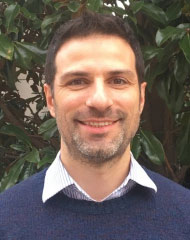"Our work as sociolinguists is to translate the linguistic efforts of visibility, legitimization and authenticity into social networks."
Francesco L. Sinatora (George Washington University) has analyzed the challenges of digital activism research in a webinar organized by the ICS.

PHOTO: Courtesy
"Our work as sociolinguists is to translate the linguistic efforts of visibility, legitimization and authenticity in social networks". So said Francesco L. Sinatora, researcher of The George Washington University (USA) on the occasion of the webinar'Potentials and Challenges of Researching Digital Discourses of Protest: Case Studies from the Arab Levant'. This lecture has been offered in the framework of the project Marie Curie WONT-HATE funded by the European Commission, developed by the researcher Eleonora Esposito at the project 'Public discourse' of the Institute for Culture and Society (ICS) of the University of Navarra.
According to the expert, the new digital media have changed the way of exercising socio-political activism, as well as the way in which this phenomenon can be investigated. He said that the main challenges for emerging social movements are visibility and representation. For Sinatora, new media allow them to be present in the public sphere but, at the same time, they can jeopardize their visibility through algorithms. "If a narrative goes viral, it prevents dissenting voices from emerging," he has pointed out. An example is an advertisement from Kuwait that reinforced the Syrian government's official narrative that Arab Spring activists were radical Islamic terrorists, as explained by researcher.
On the other hand, feminist collectives, emerging from the Arab Spring and the 'Me too' movement, have increased their presence on social media, making their cause visible. To do so, these groups have used hybrid forms of language, explained researcher, such as mixing standard Arabic and dialects, using visual tools and sharing images of protests on their social networks. This phenomenon has been referred to by Sinatora and Esposito as digital mirroring. "Digital mirroring has promoted the emergence of new forms of trans-regional Arab feminism," she has noted.
New tools for research"Documenting this subject of digital discourses is important as it has an impact on other forms of emancipation beyond the Arab world," Sinatora added. He explained that the language of activism is highly symbolic, for example, the use of various languages serves to legitimize and give authenticity to their causes. However, he regretted that this linguistic work is often lost in a global environment. For this reason, he stressed the importance of translating this effort of visibility and legitimization through research.
To develop work researcher in the new media, the expert pointed out the need to use emerging sociolinguistic tools such as hybridization or indexicality, as well as the concept of chronotopes. According to Sinatora, sociolinguist Blommaert defined chronotopes as "invocable histories." This means that "activists position themselves in history by working a symbolic language in social networks," he said. Thus, for Sinatora, studying linguistic activity in social networks is an action of historical documentation.





